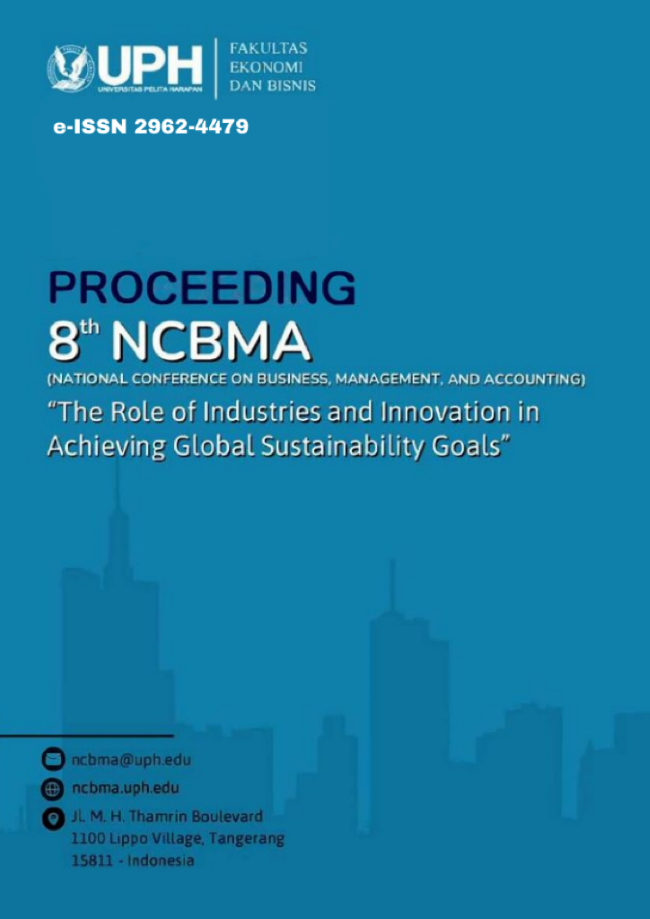ANALYSIS OF GREEN EMPOWERMENT, CAREER OPPORTUNITIES, EMPLOYEES TEAMWORK AND WORK SATISFACTION TOWARD JOB PERFORMANCE IN PT. ABC GENERAL CONTRACTOR COMPANY IN SIDOARJO
Trefwoorden:
Green Empowerment, Career Opportunities, Employee Teamwork, Work Satisfaction, Job PerformanceSamenvatting
The transition towards sustainable business practices has led to the increasing importance of job performance, which is influenced by various organizational and individual factors. This study analyses the impact of Green Empowerment, Career Opportunities, Employees’ Teamwork, and Work Satisfaction on Job Performance. These factors are essential in fostering an environmentally responsible workforce, ensuring that sustainability goals align with organizational and employee objectives. Contractor industry is one of the good examples of how job performance should be applied focusing on green aspect. The performance of general contractor companies plays a crucial role in the success of construction projects and influencing cost efficiency. Using a quantitative approach, data was collected from employees working in environmentally conscious organizations and analyzed using SPSS software statistical tool. This research explores how Green Empowerment, which involves providing employees with autonomy and resources to implement sustainable practices—affects job performance. Additionally, Career Opportunities may serve as motivation for employees to commit to environmental initiatives within their organizations. The study also examines the role of Employees’ Teamwork in fostering a shared responsibility for sustainability efforts. Furthermore, Work Satisfaction is considered as a factor that may enhance employees' commitment and job performance. By investigating these relationships, this study aims to contribute to the growing literature on green human resource management and provide insights into strategies that organizations can adopt to enhance Job Performance. The findings of this research can help businesses develop more effective sustainability policies and improve their overall environmental impact.
Referenties
Al Halbusi, H., Williams, K. M., & Ramayah, T. (2020). The role of ethical leadership in the relationship between internal communication and employee performance. Management Research Review, 43(9), 1051–1071.
Alrawahi, W., Sellgren, S. F., Altoubi, S., Alwahaibi, N., & Brommels, M. (2020). The role of job satisfaction in the relationship between transformational leadership and organizational commitment: A study in a healthcare setting. Leadership in Health Services, 33(1), 51–68.
Bakker, A. B., & Demerouti, E. (2007). The job demands-resources model: State of the art. Journal of Managerial Psychology, 22(3), 309–328.
Bakotić, D. (2016). Relationship between job satisfaction and organisational performance. Economic Research-Ekonomska Istraživanja, 29(1), 118–130.
Campbell, J. P., & Wiernik, B. M. (2015). The modeling and assessment of work performance. Annual Review of Organizational Psychology and Organizational Behavior, 2, 47–74.
Cho, Y. J., & Lee, I. (2019). Reducing burnout in the workplace: The effects of family-supportive supervisor behaviors. International Journal of Human Resource Management, 30(7), 1109–1132.
Clarke, M. (2013). The organizational career: not dead but in need of redefinition. International Journal of Human Resource Management, 24(4), 684–703.
De Vos, A., & Meganck, A. (2017). What HR managers do versus what employees value: Exploring both parties’ views on retention management from a psychological contract perspective. Personnel Review, 38(1), 45–60.
Hirschi, A., Herrmann, A., & Baruch, Y. (2018). Career adaptability, employability, and career self-management. Journal of Vocational Behavior, 104, 1–13.
Judge, T. A., Thoresen, C. J., Bono, J. E., & Patton, G. K. (2001). The job satisfaction–job performance relationship: A qualitative and quantitative review. Psychological Bulletin, 127(3), 376–407.
Mathieu, J. E., Gallagher, P. T., Domingo, M. A., & Klock, E. A. (2017). Embracing complexity: Reviewing the past decade of team effectiveness research. Annual Review of Organizational Psychology and Organizational Behavior, 4, 17–46.
Mesmer-Magnus, J. R., & DeChurch, L. A. (2009). Information sharing and team performance: A meta-analysis. Journal of Applied Psychology, 94(2), 535–546.
Motowidlo, S. J., & Kell, H. J. (2012). Job performance. In Handbook of Psychology (Vol. 12, pp. 82–103). Wiley.
Ng, T. W. H., Eby, L. T., Sorensen, K. L., & Feldman, D. C. (2019). Predictors of objective and subjective career success: A meta-analysis. Personnel Psychology, 72(1), 67–108.
Renwick, D. W. S., Redman, T., & Maguire, S. (2016). Green HRM: A review and research agenda. International Journal of Management Reviews, 18(1), 1–14.
Robbins, S. P., & Judge, T. A. (2019). Organizational Behavior (18th ed.). Pearson Education.
Rotundo, M., & Sackett, P. R. (2002). The relative importance of task, citizenship, and counterproductive performance to global ratings of job performance. Journal of Applied Psychology, 87(1), 66–80.
Salas, E., Shuffler, M. L., Thayer, A. L., Bedwell, W. L., & Lazzara, E. H. (2015). Understanding and improving teamwork in organizations: A scientifically based practical guide. Human Resource Management, 54(4), 599–622.
Salas, E., Shuffler, M. L., Thayer, A. L., Bedwell, W. L., & Lazzara, E. H. (2015). Understanding and improving teamwork in organizations: A scientifically based practical guide. Human Resource Management, 54(4), 599–622.
Shah, N., Mehmood, T., & Ishaque, M. (2019). Impact of employee satisfaction on organizational commitment: A case study of private sector universities in Pakistan. Global Management Journal for Academic & Corporate Studies, 9(1), 1–11.
Shuffler, M. L., DiazGranados, D., & Salas, E. (2018). There's a science for that: Team development interventions in organizations. Current Directions in Psychological Science, 27(6), 463–469.
Tannenbaum, S. I., Mathieu, J. E., Salas, E., & Cohen, D. (2012). Teams are changing: Are research and practice evolving fast enough? Industrial and Organizational Psychology, 5(1), 2–24.
Yong, J. Y., Yusliza, M. Y., Ramayah, T., & Fawehinmi, O. (2020). Nexus between green intellectual capital and green human resource management: Empirical evidence from Malaysian green technology industry. Journal of Cleaner Production, 242, 118458.


